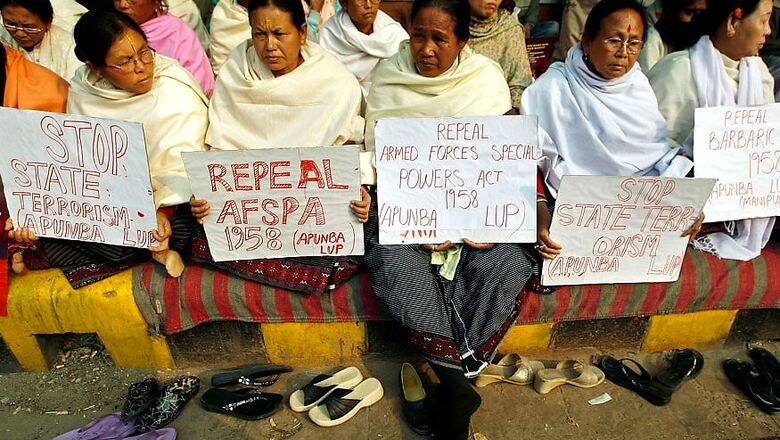
views
New Delhi: In a landmark order, the Supreme Court on Friday rejected Army’s submission that it had already investigated the alleged encounter killing cases in Manipur and that there was no need for any further probe, and ordered a CBI probe.
In this order, the bench led by Justice Madan B Lokur, considered the allegation of human rights violation in Manipur and stated that “CBI will look into these cases of deaths... we have ordered the CBI director to constitute a team in two weeks… he will inform us about the composition of officers in three weeks.”
But with Armed Forces Special Powers Act in place in Manipur, the order to probe the Army and police personnel has raised doubt as to whether it could pose a question on AFSPA itself.
Major Gen (Retd) Ashok K Mehta, who was founder-member of the Defence Planning Staff in the Ministry of Defence, told News18 that the order could lead to “piercing of the blanket autonomy of AFSPA by judicial interference.”
“AFSPA is no longer a complete code as it used to be. Just like how Justice Sunanda Bhandare opined on Section 18 of the Army Act which gave the President the power to terminate the services of a staff depending on his pleasure, now even the blanket autonomy of AFSPA stands pierced by judicial interference. Now AFSPA is slowly becoming justiciable,” said Major Gen Mehta.
Echoing Major General Mehta’s view, Babloo Loingtonbam, who was the original petitioner in the case, told News18 that this order meant that “AFSPA’s powers were being chipped off.”
“AFSPA explicitly entails that there can be no legal probe by the central government and now a probe has been ordered and this precisely means that AFSPA provisions have been chipped away in a sense,” said Loitongbam.
In a petition filed before the Supreme Court in 2012, Loitongbam, director of Human Rights Alert, and the Extra Judicial Execution Victim Families Association (EEVFAM) claimed that 1,528 people were killed in staged encounters by security forces in Manipur. The extra-judicial executions took place between May 1979 and May 2012, according to the petition.
However, Major General (Retd) BK Sharma, Deputy Director (Research) and Head of Centre for Strategic Studies and Simulation, The United Service Institution of India, differed from this viewpoint and said that “this once incident cannot hint to a fact that AFSPA could be withdrawn in the near future.”
“One incident cannot hint towards a fact that AFSPA could be withdrawn. Only when there is a sustained environment of peace which does not warrant interference by the Army, only then the question of withdrawing AFSPA arises. Plus, judiciary can only check the efficacy of the way AFSPA is being implemented and not the act in itself. Whether AFSPA needs to be lifted or not is a call that needs to be taken by either Central or State governments. Hence, courts have nothing to do with it. Yes, there can defects in the way the department is implementing AFSPA and Army should look within and correct itself, but this order in itself does not hint in any feeling that AFSPA could be withdrawn,” said Major General Sharma.
Even Major General Ashok Mehta said that most of these allegations are usually false. “Most of these allegations against the Army are usually false and have no meat. Even according to a human rights report, there was earlier a case where there were allegations that around 1678 encounters were carried out. But it was reported that 80% of those allegations were false,” said Mehta.
The court on Friday has stated that the CBI director has to form the Special Investigation Team (SIT) and now the case has been listed for January, 2018.


















Comments
0 comment